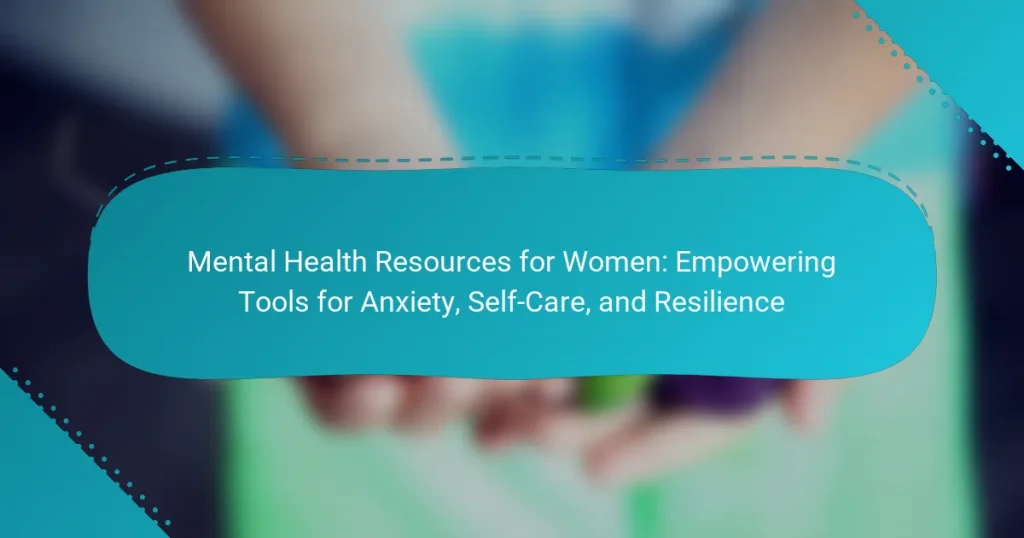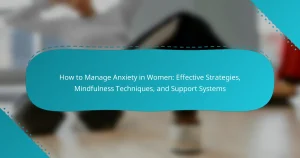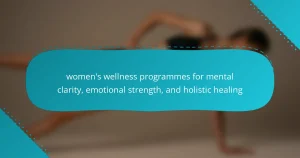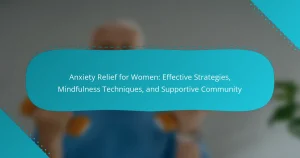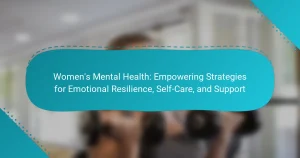Mental health resources for women provide essential tools to effectively manage anxiety, enhance self-care, and build resilience. This article explores therapy options like cognitive-behavioral therapy, the benefits of support groups, and the accessibility of online platforms and mental health apps. Understanding unique experiences and engaging in self-care practices can significantly improve emotional well-being. Prioritising mental health is crucial for fostering resilience and overall quality of life.
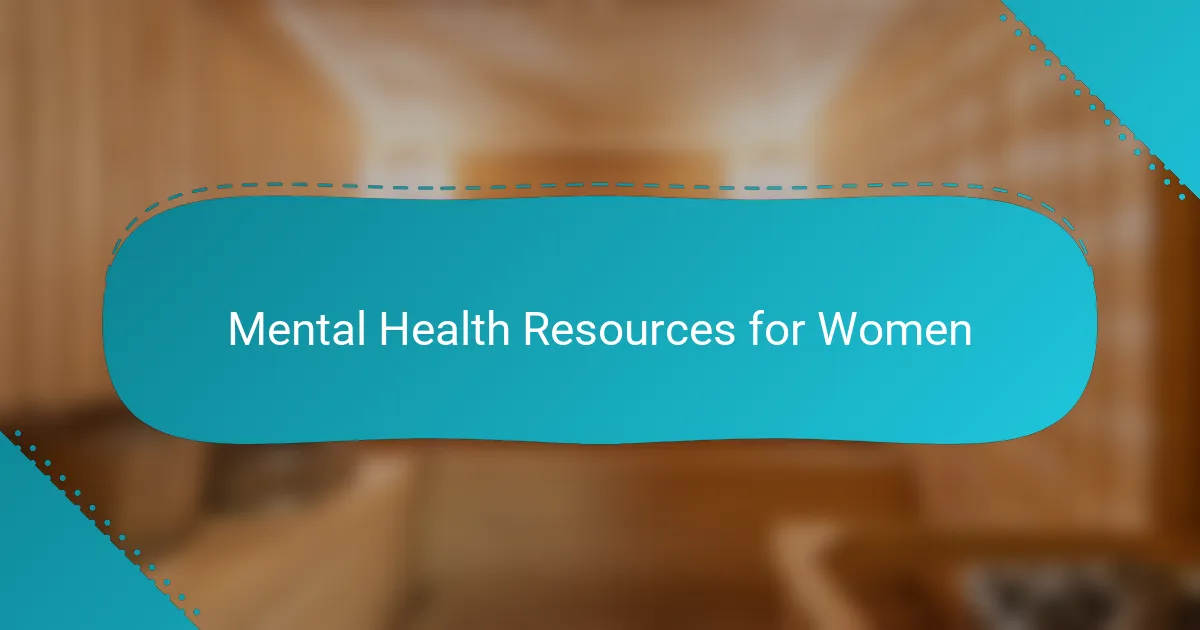
Mental Health Resources for Women
Mental health resources for women focus on empowering tools to manage anxiety, enhance self-care, and build resilience. These resources include therapy options, support groups, and online platforms that provide valuable information and community support.
Therapy options like cognitive-behavioral therapy (CBT) have shown effectiveness in reducing anxiety symptoms. Support groups offer a safe space for sharing experiences, fostering a sense of belonging. Online platforms, such as mental health apps, provide accessible self-care tools and coping strategies.
Research indicates that women are more likely to experience anxiety disorders, making targeted resources crucial. Engaging with these tools can lead to improved mental well-being and resilience against stressors. Prioritising mental health is essential for overall quality of life.
What are the key mental health challenges faced by women?
Women face unique mental health challenges, including anxiety, depression, and body image issues. These challenges often stem from societal pressures and gender roles. Research indicates that women are twice as likely to experience anxiety disorders compared to men. Additionally, hormonal fluctuations can exacerbate mental health issues, particularly during menstrual cycles, pregnancy, and menopause. Access to mental health resources tailored for women can empower them to develop resilience and effective self-care strategies.
How do societal expectations impact women’s mental health?
Societal expectations significantly affect women’s mental health by creating pressures that can lead to anxiety and stress. These pressures often stem from traditional roles, beauty standards, and professional expectations. Studies show that women frequently experience heightened anxiety levels due to societal judgments, impacting their self-esteem and resilience. Mental health resources tailored for women, such as support groups and self-care strategies, can empower them to navigate these challenges effectively.
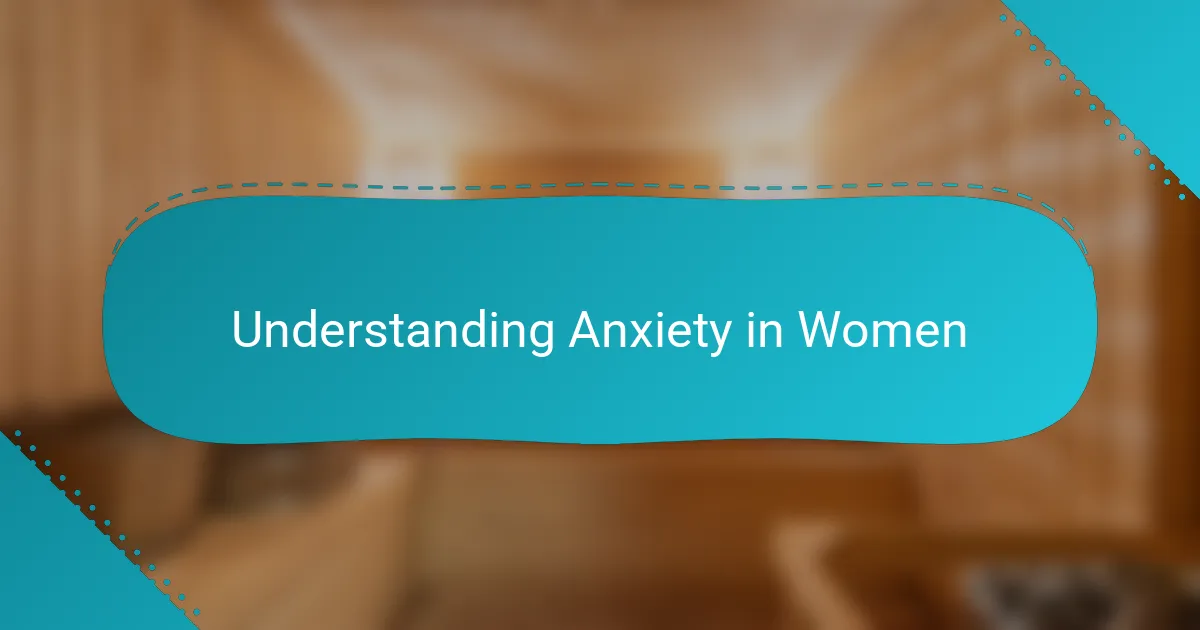
Understanding Anxiety in Women
Understanding anxiety in women involves recognizing its unique manifestations and impacts on mental health. Women may experience anxiety differently due to hormonal fluctuations, societal pressures, and life roles. Mental health resources tailored for women empower them with tools for managing anxiety, promoting self-care, and building resilience. Effective strategies include mindfulness practices, therapy options, and community support networks. Research indicates that women are more likely to seek help, enhancing their ability to cope with anxiety. By utilizing these resources, women can foster emotional well-being and improve their quality of life.
What are the common symptoms of anxiety in women?
Common symptoms of anxiety in women include excessive worry, restlessness, difficulty concentrating, irritability, muscle tension, and sleep disturbances. Women may also experience physical symptoms like increased heart rate and fatigue. These symptoms can vary in intensity and duration, impacting daily life. Recognizing these signs is crucial for seeking appropriate mental health resources and support.
How does anxiety manifest differently in women compared to men?
Anxiety manifests differently in women compared to men, often with women experiencing more intense emotional symptoms. Women may display anxiety through physical symptoms such as fatigue and sleep disturbances, while men might exhibit irritability and anger. Research indicates that hormonal fluctuations can influence anxiety levels in women, making them more susceptible during certain life stages, such as menstruation or menopause. Additionally, social expectations may lead women to internalize anxiety, resulting in higher rates of depression alongside anxiety disorders. Understanding these differences is crucial for tailoring mental health resources and support specifically for women.
What role do hormonal changes play in women’s anxiety?
Hormonal changes significantly influence women’s anxiety levels. Fluctuations in estrogen and progesterone can lead to increased stress sensitivity and mood swings. During menstrual cycles, pregnancy, and menopause, these hormonal shifts can exacerbate anxiety symptoms. Research shows that women are more likely to experience anxiety disorders, particularly during these hormonal transitions. Understanding this connection can empower women to seek appropriate mental health resources and self-care strategies tailored to their unique experiences.
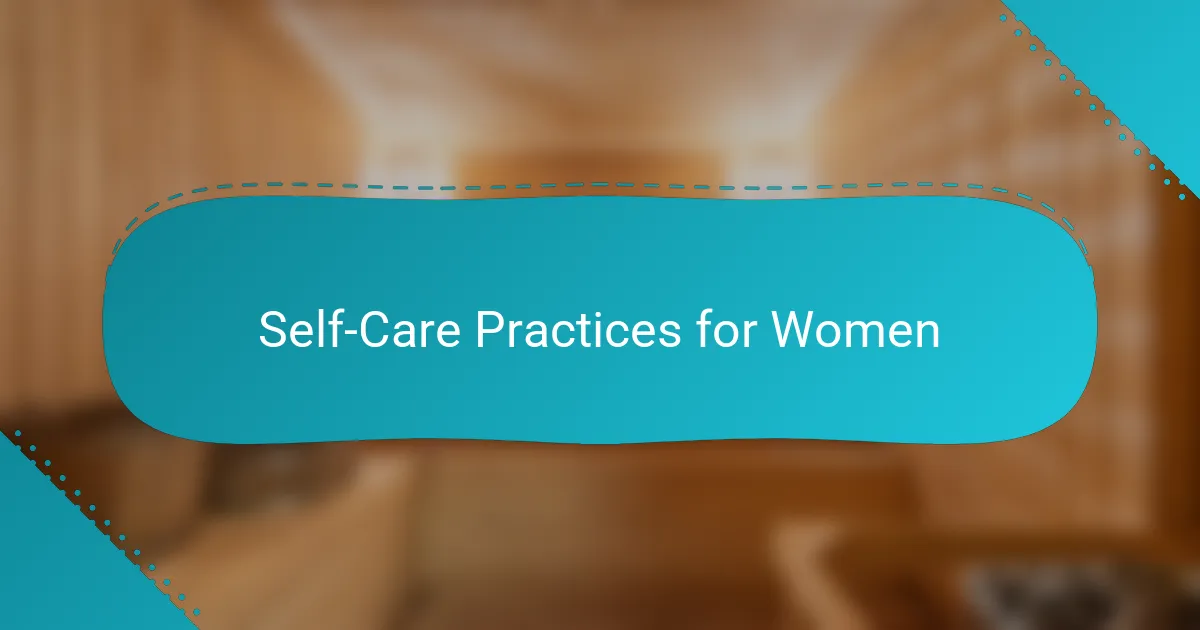
Self-Care Practices for Women
Self-care practices for women are essential for managing mental health and enhancing resilience. Incorporating tools like mindfulness, journaling, and exercise can significantly reduce anxiety levels. Regular self-care routines empower women to prioritise their mental well-being, fostering a supportive environment for emotional growth. Research shows that engaging in these practices can lead to improved mood and overall life satisfaction.
What are effective self-care strategies for managing anxiety?
Effective self-care strategies for managing anxiety include mindfulness practices, regular exercise, and establishing a strong support network. Mindfulness techniques, such as meditation and deep breathing, can reduce stress and improve emotional regulation. Engaging in physical activity releases endorphins, enhancing mood and resilience. Additionally, connecting with friends or support groups provides emotional validation and shared experiences, fostering a sense of belonging. Prioritising sleep and maintaining a balanced diet are also crucial for overall mental well-being. Implementing these strategies consistently can lead to significant improvements in managing anxiety.
How can journaling support mental wellness?
Journaling enhances mental wellness by providing a safe space for self-reflection and emotional expression. It helps reduce anxiety, improve mood, and foster resilience through structured thought organization. Regular journaling can lead to greater self-awareness and clarity, enabling women to better manage stress and emotional challenges. Studies indicate that expressive writing can result in significant decreases in anxiety levels, contributing to overall mental health improvement.
What role does physical activity play in self-care?
Physical activity is crucial for self-care as it significantly enhances mental health and resilience in women. Regular exercise reduces symptoms of anxiety and depression, promoting emotional well-being. It also boosts self-esteem and cognitive function, creating a positive feedback loop that supports ongoing self-care practices. Engaging in physical activity fosters a sense of community and connection, further strengthening mental health resources for women.
Which self-care resources are specifically designed for women?
Mental health resources specifically designed for women include various tools that address anxiety and promote self-care. These resources often encompass therapy apps, support groups, and educational materials tailored to women’s unique experiences.
1. Therapy Apps: Platforms like Talkspace and BetterHelp offer therapy focused on women’s mental health issues, including anxiety and depression.
2. Support Groups: Organizations such as Women’s Mental Health Network provide community support and shared experiences to empower women.
3. Educational Materials: Websites like Mental Health America offer articles and guides on self-care strategies specifically for women.
4. Workshops and Retreats: Programs focused on mindfulness and resilience training cater to women’s needs, enhancing coping strategies.
5. Online Forums: Platforms like Reddit’s r/women provide spaces for sharing experiences and advice related to mental health challenges.
These resources collectively empower women by providing tools and community support essential for enhancing mental well-being.
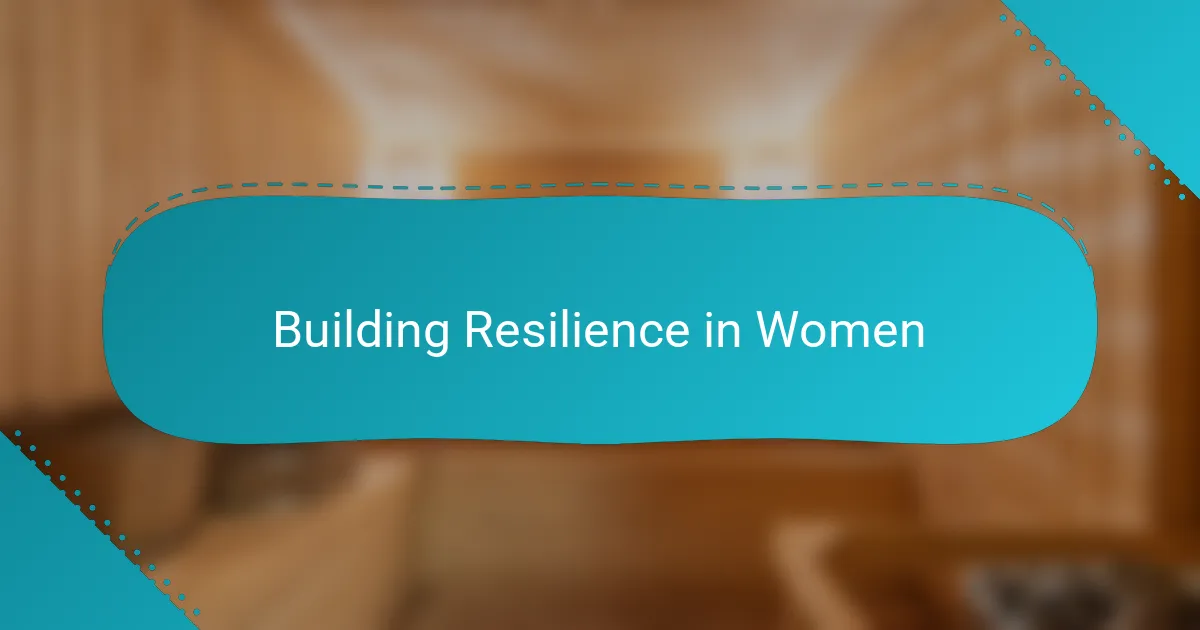
Building Resilience in Women
Building resilience in women involves utilizing mental health resources that empower them to manage anxiety and prioritise self-care. Effective tools include mindfulness practices, support groups, and cognitive behavioural techniques. Research indicates that women who engage in regular self-care activities report higher resilience levels and lower anxiety symptoms. Incorporating these resources can lead to improved mental well-being and a stronger support network, enhancing overall resilience.
What are the essential skills for fostering resilience?
Essential skills for fostering resilience include emotional awareness, problem-solving, and social support. Emotional awareness helps individuals recognize and manage their feelings. Problem-solving skills enable effective coping strategies during challenges. Building social support networks fosters connection and provides resources for overcoming adversity. Developing these skills empowers women to enhance mental health and resilience in their lives.
How can mindfulness practices enhance resilience?
Mindfulness practices significantly enhance resilience by promoting emotional regulation and stress management. Engaging in mindfulness helps individuals develop a greater awareness of their thoughts and feelings, allowing for more effective coping strategies during challenging times. Research indicates that consistent mindfulness practice can lead to a 30% increase in resilience levels among participants, particularly in women facing anxiety and stress (Keng, Smoski, & Robins, 2011). By fostering a non-judgmental attitude, mindfulness enables women to navigate their emotions more effectively, ultimately empowering their mental health journey.
What community support systems are available for women?
Community support systems for women include various mental health resources that provide empowerment and resilience. These resources focus on anxiety management and self-care strategies. Organizations like the National Alliance on Mental Illness (NAMI) offer support groups specifically for women, fostering connection and shared experiences. Additionally, online platforms like BetterHelp provide accessible counselling tailored to women’s mental health needs. Local community centers often host workshops and seminars that promote mental wellness and coping mechanisms. These systems aim to create supportive environments, enhancing women’s mental health and overall well-being.

Unique Mental Health Resources for Women
Mental health resources for women focus on unique tools that address anxiety, self-care, and resilience. These resources include specialized therapy programs, online support groups, and self-help apps designed to empower women in their mental health journey. For example, programs like “The Well Woman” offer tailored strategies for managing anxiety, while apps such as “Calm” focus on mindfulness and self-care practices. These resources enhance emotional well-being and foster resilience, making them vital for women seeking mental health support.
What specialized programs exist for women’s mental health?
Specialized programs for women’s mental health include therapy groups, online support networks, and wellness workshops. These resources focus on anxiety management, self-care strategies, and building resilience. Programs often emphasize community support and empowerment, providing women with tools to navigate mental health challenges effectively. Many organizations tailor their offerings to address unique experiences, such as motherhood or workplace stress.
How can therapy tailored for women differ from traditional approaches?
Therapy tailored for women often emphasizes relational dynamics and personal experiences, differing from traditional approaches. This specialized therapy recognizes the unique challenges women face, such as societal pressures and gender-specific mental health issues. It incorporates a holistic perspective, addressing emotional, physical, and social aspects of well-being. Research indicates that women may respond better to therapeutic techniques that foster connection and community, enhancing resilience and self-care practices. Such an approach empowers women to cultivate their identities and navigate anxiety effectively.
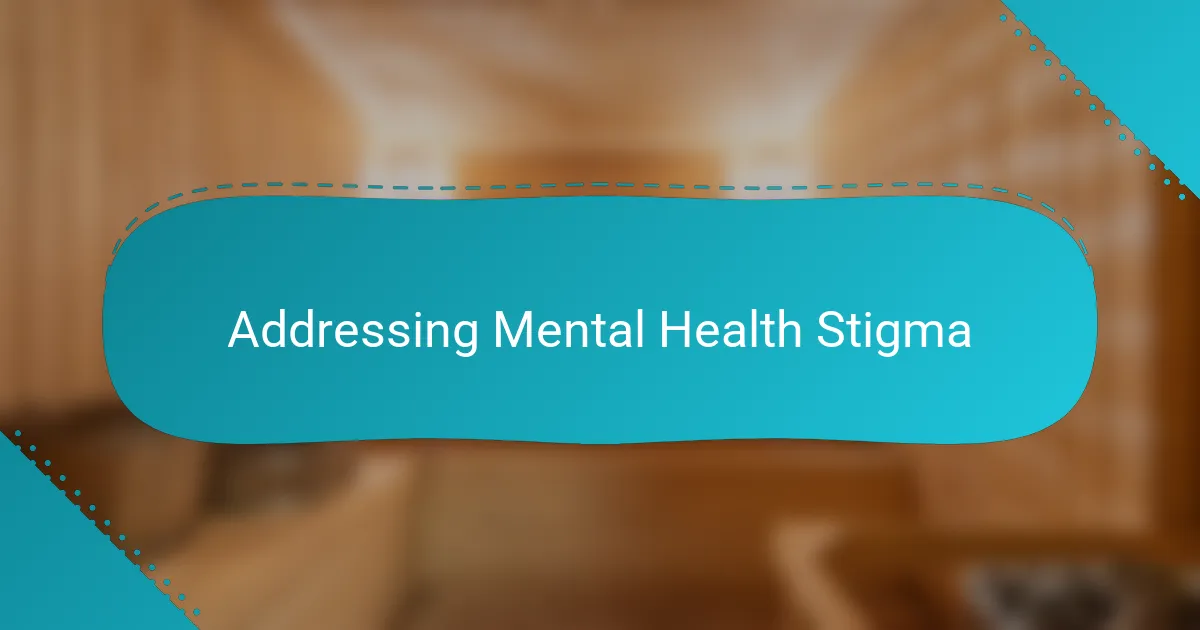
Addressing Mental Health Stigma
Addressing mental health stigma requires awareness and proactive strategies. Women can access various mental health resources to combat anxiety, enhance self-care, and build resilience. These resources include therapy options, support groups, and educational materials tailored to women’s unique experiences. For instance, studies show that women are more likely to seek help when they feel a strong support network is available. Empowering tools such as mindfulness apps and self-help books can also play a crucial role in fostering mental well-being. By utilizing these resources, women can challenge stigma and promote a healthier mindset.
How does stigma affect women’s willingness to seek help?
Stigma significantly reduces women’s willingness to seek help for mental health issues. Fear of judgment and misunderstanding can deter them from accessing essential resources. Studies show that women facing stigma are less likely to pursue therapy or support groups, impacting their overall well-being. Additionally, the perception of mental health issues as a weakness can lead to isolation, further exacerbating anxiety and stress.
What initiatives are in place to combat mental health stigma among women?
Several initiatives combat mental health stigma among women, focusing on education, support, and advocacy. Programs like the Women’s Mental Health Initiative promote awareness and provide resources tailored to women’s needs. Community workshops and online platforms foster open discussions, reducing stigma. Campaigns utilizing social media amplify women’s voices, encouraging shared experiences. Research highlights that these initiatives significantly improve mental health literacy, empowering women to seek help.
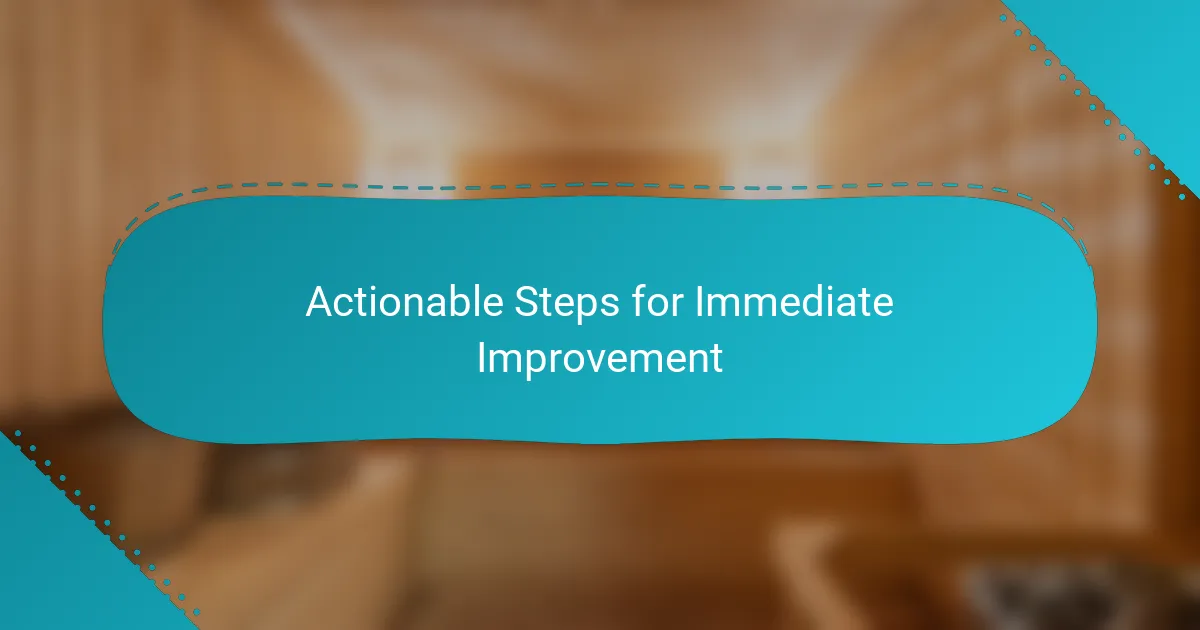
Actionable Steps for Immediate Improvement
Mental health resources for women can significantly enhance well-being through actionable steps. Prioritise self-care routines, utilize mindfulness techniques, and seek community support.
1. Establish a daily self-care practice focusing on activities that promote relaxation and joy.
2. Incorporate mindfulness exercises such as meditation or deep breathing to manage anxiety.
3. Connect with support groups or online communities to share experiences and gain insights.
4. Explore mental health apps that offer guided therapy sessions or mood tracking features.
5. Schedule regular check-ins with a mental health professional for personalized guidance.
What are the best practices for integrating mental health resources into daily life?
Integrating mental health resources into daily life involves consistent practice and accessibility. Start by incorporating mindfulness exercises into your routine, such as deep breathing or meditation. Utilize apps that offer guided sessions for anxiety management and self-care tips. Establish a support network with friends or family to share experiences and resources. Schedule regular self-care activities, like journaling or nature walks, to enhance resilience. Prioritising mental health as a non-negotiable part of your daily agenda for lasting benefits.
What common mistakes should women avoid in their mental health journey?
Women should avoid common mistakes such as neglecting self-care, minimizing their feelings, and seeking help too late. Prioritising mental health is crucial for resilience and overall well-being. Many women underestimate the importance of regular mental health check-ins, which can lead to increased anxiety and stress. Establishing a support network is essential; isolation can exacerbate mental health issues. Additionally, avoiding unhealthy coping mechanisms, like substance use, is vital for long-term recovery and empowerment.
How can women advocate for their mental health needs effectively?
Women can advocate for their mental health needs by utilizing resources, building support networks, and practicing self-advocacy. First, accessing mental health resources tailored for women can provide essential tools for managing anxiety and enhancing self-care. Joining support groups allows women to share experiences and gain insights from others facing similar challenges. Additionally, women should articulate their mental health needs clearly to healthcare providers, ensuring their concerns are addressed. Engaging in resilience-building activities, such as mindfulness and physical exercise, further empowers women to prioritise their mental well-being.
